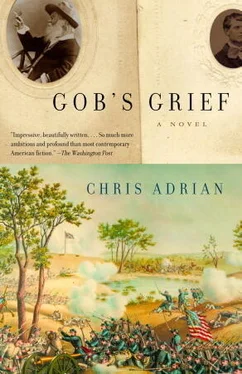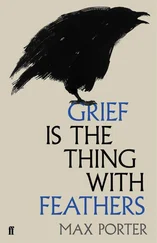Will and Jolly got separated in the last day’s fighting at Gettysburg, of which the Third had more than its fair share. Will got called away by Frenchy, whose mule had died in the quartermaster-seeking overshots of the Rebel artillery. Will himself pulled the wagon while Frenchy screeched at him to hurry. Ambulances and sutler’s tents were meeting their ends all around him. Will and Frenchy fled down the Baltimore Pike until they came to a place of comparative safety, where they waited amid a crowd of other fugitives. Frenchy’s powerful letters of recommendation helped him to appropriate a new mule. By the time Will got back to the Third’s position on Culp’s Hill, it was almost night. He spent the evening looking fruitlessly for Jolly.
On the Fourth of July, Will ventured out into the rain with Frenchy. For the first time, they saw many boys from the Third dead on the field. There was a boy, one of the first Will had met, who as they waited in the train to leave Syracuse had asked Will to do him a favor. “Hey, Goliath,” he’d said. “Give me a boost.” Will had hoisted him through the window, thinking for a moment he’d had a last-minute change of heart and was going to desert prematurely. There were women clustered around the train, come to bid goodbye to the boys of Onondaga County, and all the boy had wanted was kisses. Will held the fellow by his boots as he puckered his lips up obscenely and meshed them wetly with the wanton lips of three, five, and then ten different women. In the end, Will had dropped him on his head, and so lost his first friend in the regiment. He was a little fellow, whose lips were wide and thick. On reflection, Will understood how he might feel pressed to kiss excessively with them. Now they were gone, torn away by a bullet or a fragment of shell. Each time Will stepped in wet, soft places on the field, he worried that he’d trodden upon those sensuous lips.
Frenchy had just scolded Will for moving a pile of dead into convincing “as they fell” positions — he was supposed to be looking for the dying, not playing with the dead — when Will uncovered a living Reb. The Reb opened his gray eyes and began to squall when Will grabbed his arm. “Don’t bury me!” he said. “I ain’t dead, you son of a bitch!” It was a marvel, though, that he was alive. His belly had been opened, and his guts were spilling promiscuously from the wound. “Go away,” he said to Will, once it became clear to him that Will was not going to bury him. “Ain’t it enough that you killed me? Why don’t you leave me in peace? My granny is coming up to get me. She’ll be here soon. She doesn’t care for greasy Yanks, and one who shines and stinks like you would offend her.”
“I’ll take you to the doctors,” Will said.
“No,” said the Reb. Frenchy came waddling up excitedly.
“You beautiful boy!” he said to the Reb.
“Leave me be,” he said. But they wouldn’t. Will cleared away the bodies from around the boy and Frenchy gave him sips of whiskey from a flask. As Frenchy set up his camera, the boy put down his head and seemed to sleep, so while Frenchy wasn’t looking Will picked him up and carried him back to a hospital tent. The boy woke and began to scream horribly, and Frenchy screamed horribly, too, honking and honking as Will hurried away with the prize. Will held the Reb tight, lest something vital spill out further and drag along the ground. By the time he had reached the hospital, the boy was silent and dead. Will put him down on a door set on two saw-horses, which had lately served as a surgery table. Had Will felt anything leave as he walked? Had a spirit passed through him? It would have felt like a chill, he was sure. But he had felt nothing. He sat there for a long while, not wanting, anymore, to assist Frenchy in an enterprise that now seemed stupid and vile and immensely rude.
No matter, though. Frenchy was dead, when Will went back to him, shot through the chest as he was taking a picture. Jolly had been his subject, dead now, too — though Will was certain that he had been mostly alive for his portrait. Jolly had no obvious wound on him. Will thought he must have died of sadness and uncertainty, but when he looked closer he could see that Jolly had been shot in the thigh. He’d crossed his legs demurely, as if to hide the wound. His brow, when Will laid his hand on it, was still warm, but even as he knelt there it grew cold. For a little while he knelt with his hand on Jolly’s head, thinking of his friend dying all night long. Will’s eyes were closed. He was waiting for someone to shoot him. He wanted to say something but seemed to have forgotten, for the moment, every word he ever knew. His mother intruded into his mind, then. She dragged her green sofa onto the battlefield and reclined upon it. She gathered Jolly into her lap and cried out, “Where is it written that a woman has got to bear such a load of heartache?”
Frenchy’s camera had fallen over, but the plate inside was safe and whole. With the plate closed up in a box, Will walked to where the new mule had taken the wagon, a few hundred yards away. Under the yellow light, he poured the developer over the plate and waited for the image.
There is Jolly’s long face, his lips turned down in a frown. His eyes are open. His head is resting on his arm. He is pointing at nothing. He has wrapped his mouth around a piece of grass. Something is rising from him. It looks like a bit of dark mist in the shape of a wing.
In the Wilderness, and at Spotsylvania, at Cold Harbor and Petersburg, the Third saw the elephant abundantly, and it trampled them. Frenchy would have had many opportunities to take his world-changing picture. Brave or foolish behavior got Will back into the Tiger Mess — he saved some lives and became better liked. He wanted friends, all of a sudden, as immediately and as intensely as he had not wanted them before. He would still smash your whiskey, but that became something they could overlook in the dwindling fraternity of Company D. The boys all got in the habit of writing their names and the addresses of their families on slips of paper, which they pinned to their shirts before they went into battle. Will had a slip pinned to his shirt, but it was not his parents’ address — he didn’t want even his dead body to go back home. Instead he’d written, Sam, here I come.
Will had many near misses. It seemed that bullets wanted to touch him. He got grazed on his arms and legs, along his scalp. He lost an earlobe. But he never got a serious wound, though he felt at last that he was ready for one. Jolly’s picture, which he kept in his knapsack by day and under his head at night, cheered him. Such a spirit-shape might rise from him, when his bullet finally found him. Such a spirit-shape as rose from Jolly might have risen from Sam, might abide in some place free from the heavy cares of the war and the world.
Generous Frenchy had made up a sort of will, which he would have changed, no doubt, had he lived after his assistant betrayed him at Gettysburg. He’d left instructions with Captain Brower. In the event of his death, Will was to have his cart and all it contained, as well as a big brass key, with an address at which one could find its lock. Will sold the cart. The new mule went back to its former owner, from whom Frenchy had bullied it. Will kept only the key and Jolly’s negative.
After the war, Will went to Brooklyn, where his key opened up a musty photography studio on the fourth floor of a building in Fulton Street. The rent, he discovered, was paid through the next two years. He walked among the props — marble columns, rich draperies, painted backgrounds depicting mountains or the sea. He stood for a while under a massive skylight, looking up at the gray sky. In a dark corner, beneath a gigantic rubber blanket, he found neat tall stacks of negatives, hundreds and hundreds of them, all taken during the war, some of which he’d developed himself. Frenchy had been sending them back to this place.
Читать дальше












